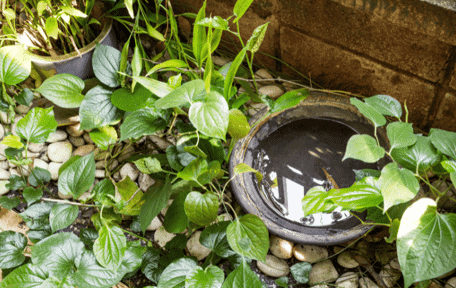Do I Need Professional Mosquito Control in Miami?
If you live in Miami, you’re probably pretty familiar with mosquitoes. When you think of professional mosquito control, you might even say you just “get used to” the mosquitoes as you’re being eaten alive - they’re just that common.
If that’s what you’re thinking, what if I told you how big of a difference professional mosquito control can make?
Professional mosquito control products aren’t just bug spray. At Native Pest Management, our expert technicians use backpack foggers and biological larvicides to reduce the mosquito populations in homes and yards.
And our products for mosquito control are eco-friendly and pet friendly, so you and your family (including fluffy friends!) can use your yard as soon as our treatment dries.
What Are Mosquitoes?
Okay okay okay, you probably know the answer to that question. Mosquitoes are little demons that fly around and cause people to get moody and lose sleep on camping trips.
But that’s not all there is to them. Do you know why mosquitoes bite us? Read away to find out!
Fun Facts About Mosquitoes
- They’ve been around since the Jurassic period, which was over 210 million years ago!
- Mosquito is Spanish for “little fly”
- In Africa, New Zealand, and Australia, they’re called “mozzies”
- There are over 3,000 species, and 175 are found in America - surprisingly, only a few hundred feed on human blood (keyword is human)
- The state with the fewest mosquito species is West Virginia, at 26. Texas has the most with 85 species, and Florida has 80
- Only females bite, and they do this so their eggs develop
- Male mosquitoes only eat nectar and plant juices (females do too when they don’t need blood)
- Mosquitoes don’t have actual teeth - they “bite” with a proboscis (butterflies have one too!) by piercing the skin and locating a capillary to draw blood
- A mosquito can drink up to three times its weight in blood
- Human blood is not their favorite kind of blood - they prefer blood from horses, cattle, and birds
- A female mosquito can lay up to 300 eggs at a time (yikes) and they do this 3 times before they die
- And while *only* “3 times before they die” may sound like a relief, females only live up to 8 weeks. Sooo one mosquito can make up to 900 mosquitoes in two months… and those 900 mosquitoes can each make up to 900 mosquitoes within two months after
- Some mosquitoes have been seen at heights of 8,000 feet
- Birds, bats, fish, dragonflies, and frogs often eat mosquitoes, meaning they play a pretty important role in the food train
- If you’re a frequent runner wearing open-toed shoes, drinking beer, and sweating, you’ll be especially attractive to mosquitoes
- They love Carbon Dioxide, which you produce when you run, so you can expect more mosquito bites on a run
- They’re surprisingly slow and weak flyers. They fly just around 1 to 1.5 miles per hour - so while you’ll catch yourself being bit while running, you can outrun them
- They like to bite people wearing dark clothing over light clothing
- A full moon means more mosquitoes
What are the Different Types of Mosquitoes in Miami?
Five common mosquitoes are flying around Miami: The Asian tiger mosquito, the yellow fever mosquito, the southern house mosquito, the black salt marsh mosquito, and the gallinipper. Let’s review each of them.
- The Asian tiger mosquito - Aedes albopictus: This mosquito is often found in objects holding water in your yard and home, like flower vases, tires, toys, bottles, cans, barrels, tree holes, and bromeliad plants.
- The yellow fever mosquito - Aedes aegypti: Just like the Asian tiger, the mosquito likes to find shelter in objects.
- The southern house mosquito - Culex quinquefasciatus: Despite the name, this mosquito is usually in organic aquatic habitats like catch basins, ditches, dairy lagoons
- The black salt marsh mosquito - Aedes taeniorhynchus: Similar to the name, these mosquitoes are often in salt marshes
- The gallinipper - Psorophora ciliata: The gallinipper mosquito is usually in ditches, containers, grassy pools, furrows of citrus groves, and pastures
While all of these mosquitoes are different species, they all share common behaviors and preferences. Mosquitoes in Miami are attracted to:
- Damp or humid areas
- Standing water
- Warm temperatures
- Dark, shady areas
- Carbon dioxide

Where Can I Find Mosquitoes in Miami?
Mosquitoes in Miami love water. They’re born in water and live three full stages of their life - egg, larva, pupa, in water before they become adults, and then they give birth in water.
So it makes a lot of sense that you’re most likely to find mosquitoes by bodies of water - they’re big fans of lakes, ponds, streams, rivers, swamps, you name it, they’re there.
And this doesn’t just end with these larger bodies of water, it also includes the little puddle in the grass after it rains, the water in the birdbath, and your kid’s toy truck. Your backyard can become a party for mosquitoes if you let it get like that.
Because they need water to increase their numbers, mosquitoes are particularly active in the rainy spring and summer seasons when there is an abundance of puddles and higher rivers, lakes, and ponds. Standing water in your yard increases the chances of a mosquito infestation.
How to Identify a Mosquito Infestation
You may know the most obvious sign of mosquitoes - the red, itchy bites - but you might not realize all of the signs that point to an infestation.
These are some signs that your mosquito problem may be bigger than you think:
- You have standing water in your yard
- You hear a constant high-pitched buzzing noise
- You have a lot of trees in your yard
- You’re getting a bit more often
- You’re scratching at night
- You find them flying over food
If the mosquitoes are inside your physical home, that’s a huge sign that you’re dealing with an infestation. No one likes waking up in the middle of the night feeling itchy, so if you’ve been inside all day and catch yourself scratching, it might be time to take action.
If you want the best results, professional mosquito control will make your house feel like home again. Native Pest Management takes the right measures using preventative mosquito control practices and pet-friendly, eco-friendly products.
But what about the discomfort you’re experiencing right this second? If you’re getting regularly bitten by mosquitoes, we understand you must be pretty tired of it and we can’t wait to help.
The first thing to know is, that there are actions you can take to reduce your mosquito bites right this second!

How to Prevent Mosquito Bites
If you haven’t decided if you want to control the mosquito populations in your yard, you can still avoid getting more mosquito bites. The first tip is to stay inside all the time, but I’m sure you don’t want to have to do that.
That also may not be the most helpful tip if the mosquitoes are already in your home - but even if that’s the case, there are other ways to stay comfortable.
Ways to limit your exposure to mosquitoes include:
- Apply mosquito repellent every time you go outside (or apply it inside). Insect repellent is a helpful short-term solution (not a permanent fix).
- Wear light-colored clothes that cover your whole body like pants and long-sleeved shirts.
- Keep socks on inside and closed-toed shoes outside.
- Avoid trips to wet areas like lakes and marshlands where mosquitoes lay eggs.
- Only go out in the middle of the day or the dead of night - sunrise and sunset are the mosquito's favorite hours
- Don’t be me when I went for a run at 6 pm on a trail surrounded by marshland. I made it exactly one mile before being attacked by a mosquito mob.
But in truth, these methods can get old after a while, especially if you have children and have to make sure they put on repellent and are properly dressed each time you go outside.
The good news is, that other solutions are way more effective. The biggest key to mosquito control is to reduce the mosquito populations on your property.
Remember what I said about how mosquitoes lay up to 300 eggs, 3 times in their lives? Yeah, that means there’s a lot of mosquitoes out there.
Since mosquitoes breed in water, the trick is to pay attention to water sources around your home - specifically controllable stagnant water collected in objects like kids' toys and birdbaths.
What about swimming pools and lakes?
If you have a pool and you take care of it, you don’t have to worry about mosquitoes breeding in the water. If you live on a lake, that's a slightly different challenge - you can’t exactly clean a lake.
But what you can do is try removing excess debris in the lake that mosquitoes can use as a habitat. You can also try adding an aeration system to keep the water moving or adding mosquito fish, which are small fish that eat mosquitoes as a tasty snack.
But still - keeping track of every drop of water in your yard can be difficult, which is why you might want to look into hiring a professional.

Professional Mosquito Control in Miami, FL
Some homeowners take a DIY approach to manage their mosquito problem by staying inside at designated times, using repellents, and removing standing water from their yards.
Others, however, are not as lucky. The truth is, that mosquito control in Miami is tricky since the warm temperatures and humidity are so ideal for them.
There are so many mosquitoes constantly multiplying and going to different locations that it’s hard to keep up with them. With the speed and number of eggs that they breed, it’s likely that your house to be their dream spot.
When you try to control mosquitoes in Miami alone, it’s likely that you’ll quit when you see results, only to run into the same issues a few months later. When any of these situations happen, it's the perfect time to call mosquito experts who can help you and your family enjoy the outdoors again.
Native Pest Management’s mosquito control services are safe for pets and can result in a noticeable reduction in mosquitoes through continual use.
Some pest control companies spray your yard and call it a day. Mosquito sprays might work at that moment, but what about in the future?
What’s to stop mosquitoes from returning?
At Native Pest Management, we’re all about preventative mosquito control. Using our backpack fogging and larvicide application methods, your house will be protected monthly. If you schedule a monthly service with us, your house will be mosquito-free for a whole year.
If you continue that annually, you’ll never have to worry about mosquitoes in your home again!
We know all the tricks to effective mosquito control in Miami. Our professional treatments reduce mosquito populations far enough that you won’t even notice them.
You can trust our dedicated team at Native Pest Management. We’ve been featured in many news outlets such as the Palm Beach Post and CBS News Channel 12 for our successful efforts.
We’re proud to be included on the list of highest-rated companies in Florida by Top Rated Local®, an organization that takes the ratings and reviews from numerous customer review websites and ranks them accordingly. We’re also honored to rank #1,494 on the Inc. 5000 List of the Fastest-growing Private Companies in 2021.
We focus on providing you with the most dynamic and customized care using our pet-friendly and eco-friendly mosquito control products. Our priority is to get your lawn mosquito-free, so you can count on us to provide the best mosquito control in Miami, Fort Lauderdale, West Palm Beach, Port St. Lucie, and Tallahassee, FL.
Give us a call to request your FREE quote today!
